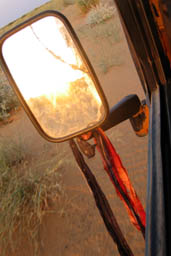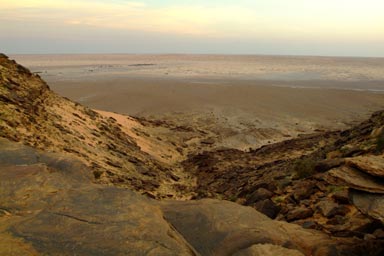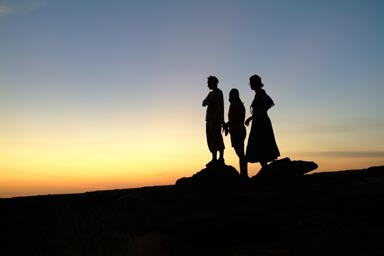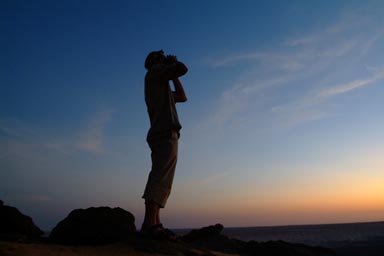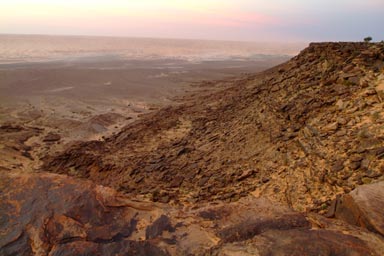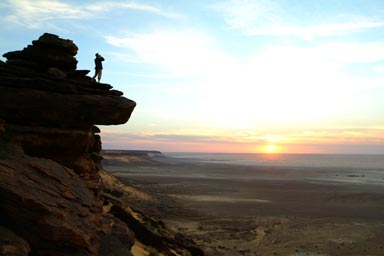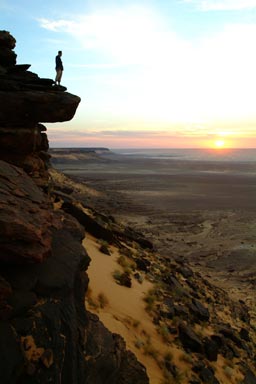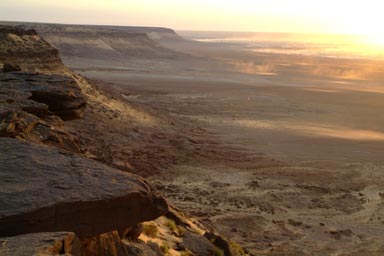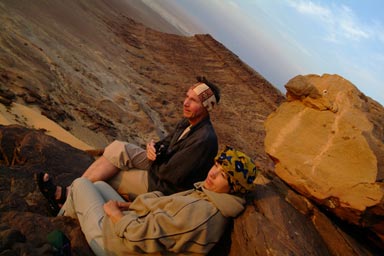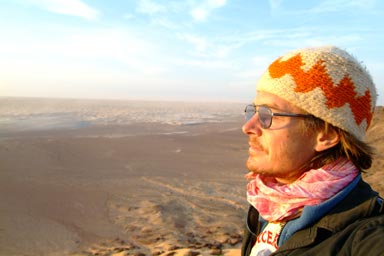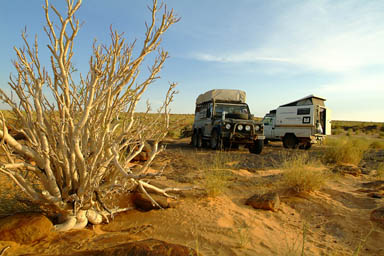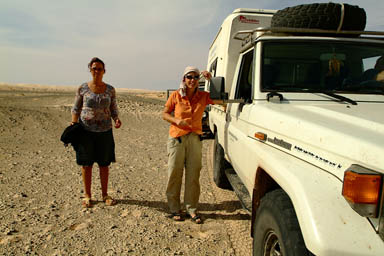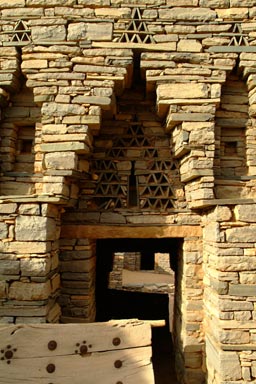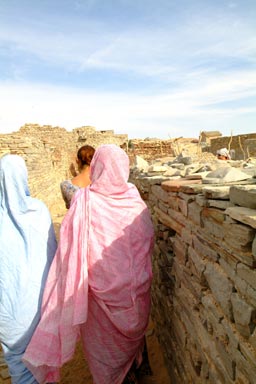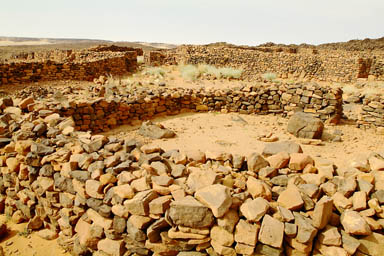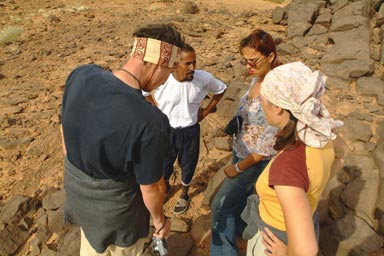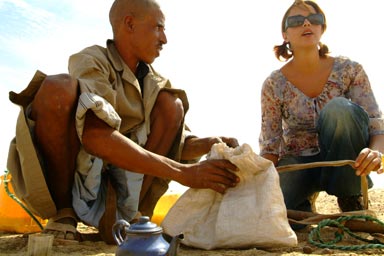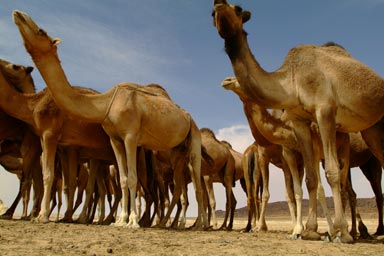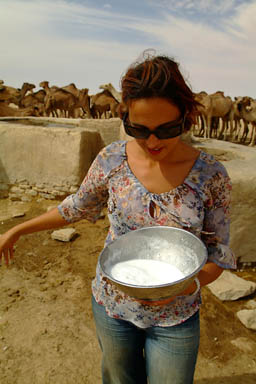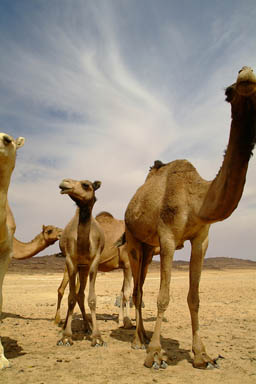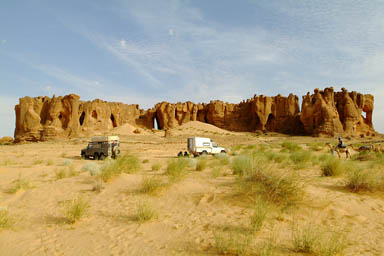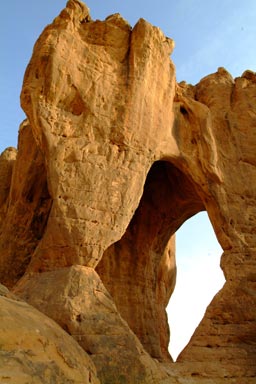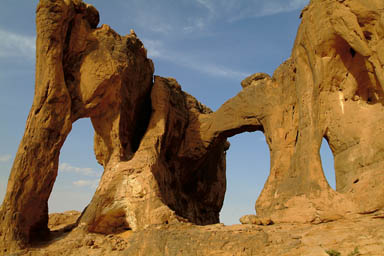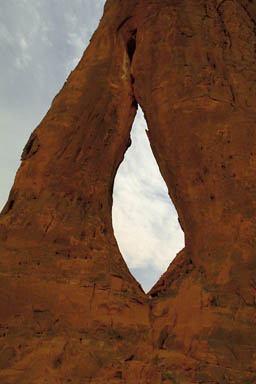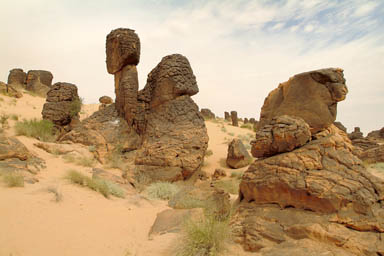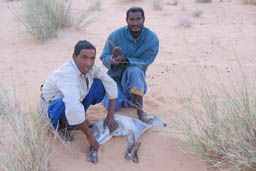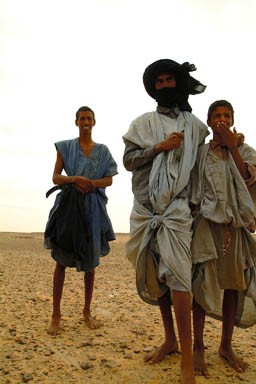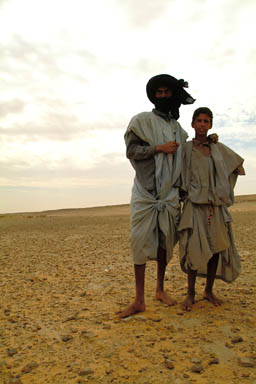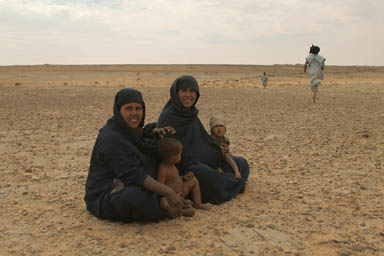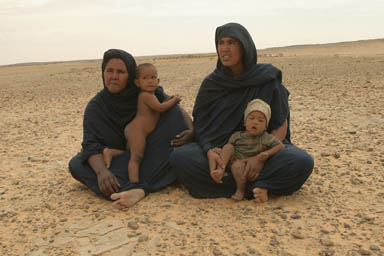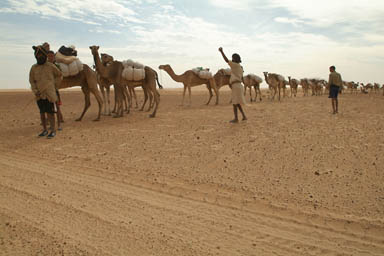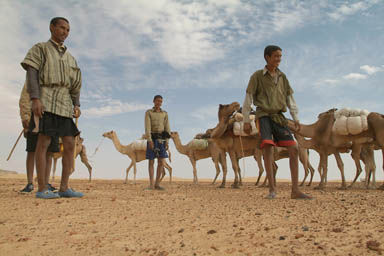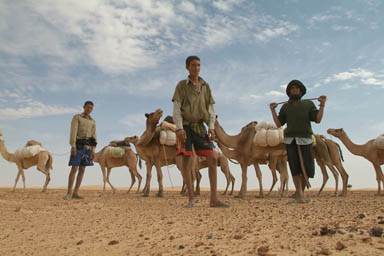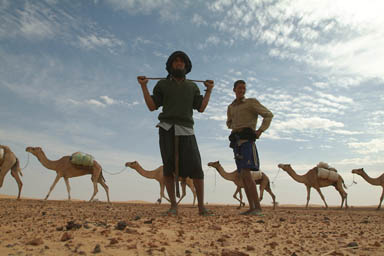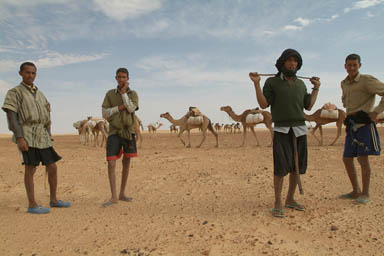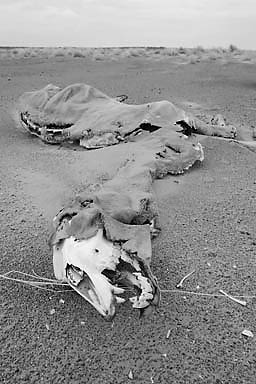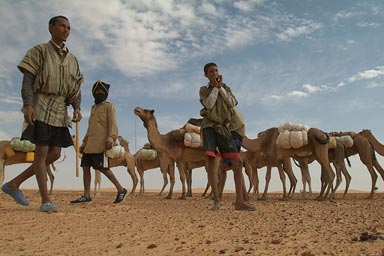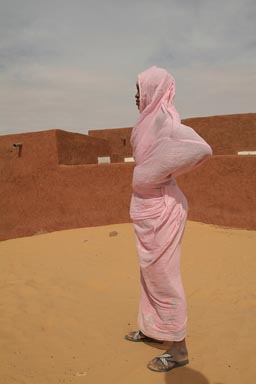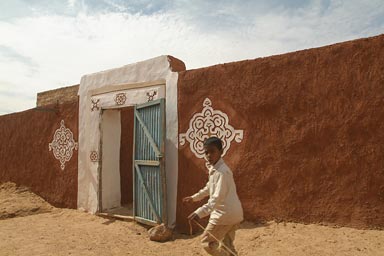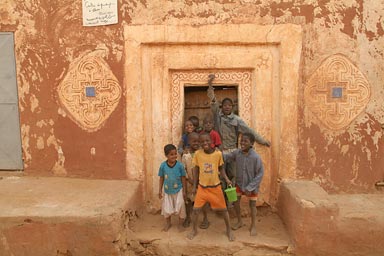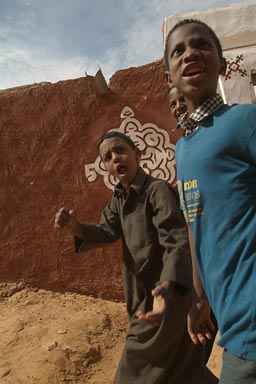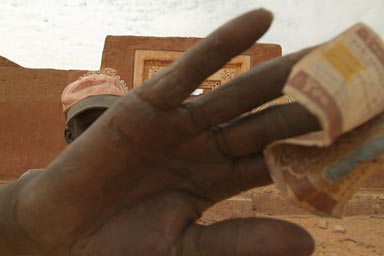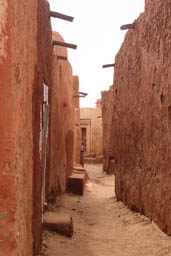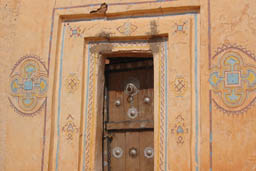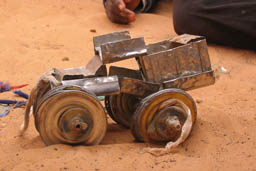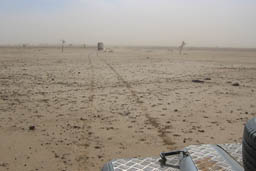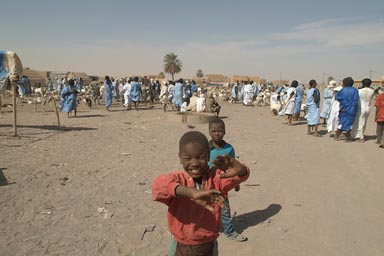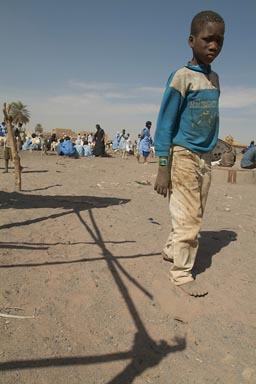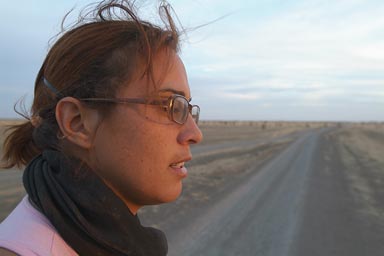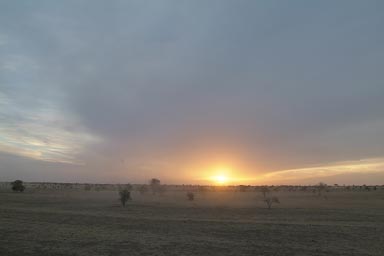www.thisfabtrek.com > journey > africa > mauritania > 20051225-nema
Tidjikdja
Download GPS (KML) track/waypoints.
In Tidjikdja we stock up with food and water - and diesel, even the jerry cans we fill up. The journey would be long and arduous and sandy driving conditions raise fuel consumption considerably. 28 litres as compared to 15 is all too possible. And what do we know about the road conditions... ?
And in Tidjikdja we do the necessary repairs to the vehicle.
Foremost I am glad my Engel-fridge is working again, not that we are carrying large amounts of beer that need to be kept cold, as a matter of fact we ran out after leaving Nouakchott, 3 weeks ago.
But I feel good that it was just a bad plug/cable connection that needed remending. The rattling and dust has taken its toll - and of course when the Landy fell over on the St.Louis to Atar desert tour and the fridge got tossed around in the back...
The journey to Nema should last some 6-8 days, 800 to up to 1.000km (depending on tours and detours we take), and lead us through mostly desert area, towards the east first later south, always following some mountain range, sometimes on its top, sometimes along its foot.
The route we plan to take is hardly being driven. Not by tourists (we would meet only one other (English) overlander already past Oualata), tourists in Mauritania seem to be rare in general. In the Pharaoh de desert camping in Tidjikdja, Birgit and Robert and Hasna and I are the only clients. The coup from last summer is still weighing heavily on the Westerner's minds.
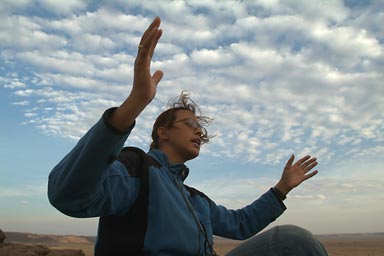
There'd be probably some trucks on the way to Tichit and after Oualata, but hardly in between. Tichit (on the way east) and Oualata (already halfway south), would also be the only villages of size.
But having said that, we believe there'd be plenty of smaller settlements along the mountain ranges with water holes and wells and watering places for camels and goats and people, the Bedouins, that live and roam in the area and - maybe we would meet a caravan.
These are our perceptions about the route. A route I only dreamed of undertaking. Too unreachable it always seemed. Too far, too deep back in the desert it looked to me on maps. But luck stroke - we have met Birgit and Robert and together it seems doable without too much risk.
So we are leaving Tidjikdja after midday, actually lively and friendly it was. "Tidjikdja was a lot different, if not to say dead, when we were last here" some 5 ? years ago, says Robert. It feels good to hear actual development is happening to the good of the people.
Look down on a sea of dunes.
We take the route east, it's Dec 19th, my birthday and we are listening to Green Day's American Ideot Album, the way you should, loud. Freedom maybe not just another word. Living it is important.
This evening Robert leads us to a super spot, he knows about or has been there before.
From the top of the mountain plateau, the cliffs fall off sharply, and underneath is the desert everywhere, as far as the eyes can see, first a flat plain it moves over into a vast field or sea of sand dunes. We are just a second late for sunset but up early the next morning for a fantastic sunrise. Only Hasna decides to stay in bed a bit longer.
Sunrise
Tichit
We continue our journey, - next stop Tichit.
Largest town we would come through, but still a village. We pass here on 20th of Dec. Hasna wants to buy meat, I want to buy bread, but none is avail.
We walk around town, it has a mosque made of stones, nicely redecorated. Old structures, it seems, are being rebuilt.
We find construction material and new stones at every corner next to the rubble that has been torn down. Some outside money is being put to work here. I cannot find out though under which scheme or who's behind it.
Acrejit
There is probably no meat we could buy in Akrejit (or even Arhrijit) either (goats are being slaughtered in the morning, to be sold during the day), so we drive through and look for the ancient town near by which we find on the top of a hill. We set up camp next to it.
More and more I feel that Hasna is getting a bit nervous. NO meat makes her nervous.
How long can you live of rice and vegetables, tiéboudienne (Senegalese) style and Spaghetti? She has stopped preparing the couch à riz (spicy lentils and rice, quite saucy) for reasons unknown. Think, we have got to get our hands on meat soon (as a plan for tomorrow).
The next morning we look at and investigate the ruins of what must have been a quite civilised and organised rich little town.
The town must have been strategically well placed overlooking several valleys. At its peak during the 16th century it was home to some 6.000 people (Berbers), living of the Sahara trade (taxing/securing it) that kept the region alive for hundreds of years. They finally had to give in to the onslaught of the conquering Hassanits (Arabs), that make up Mauritania still today.
Our guide, or keeper of the site, Chk (Sheik) Ould Amane speaks hardly any French, but thanks god we have Hasna and her knowledge of the Hassaniya language. According to our guide of course it was the primitive (Berbers) that were overthrown by the faithful. I just thought a town of 6.000 needs some degree of sophistication and organisation.
Camels.
We are continuing our journey, looking for meat when we can.
We reach a watering place, a well with lots of camels around, some goats as well. The men with the camels don't have any meat for sale but are happy to provide us with some fresh camel's milk. Hasna draws the milk herself (of course).
Guelb el Makhsor.
We are continuing our journey, looking for meat when we can.
We reach the rock formation of Guelb el Makhsor. A set of teeth of a giant.
The guardian of the site, Ali Ould Mohamed Vall, is also in the meat business. In the hour after sunset, a goat is being slaughtered and 4 kilos of meat sold to us, enough for the next few days.
That should get us to Nema and over Christmas.
The desert stays fascinating, keeps surprising us, again and again, with the stone formations that the wind created over the centuries.
Now we have meat, goat on the menu for a few days. On the evening of the 22nd Hasna prepares a goats cous-cous.
It seems Christmas comes early this year.
Bedouins
Caravan
You are not supposed to stop a caravan, and they did not want to be stopped, waved us to continue our journey, but stubborn we are, we stopped in their way, in the end they enjoyed the break and a chat with Hasna.
The caravan, not very large, just some 30 camels, on their way to Oualata carrying fodder (gras they cut) for goats.
Getting to Oualata the next day, we discover they have already arrived. So they have been pretty fast.
A caravan moves at constant speed, never stops, even tea is brewed while on the go. Stopping it causes confusion, camels may lay down, try to strip themselves of their load, a nightmare for those in charge.
Oualata
The 24th, Chistmas Eve, we reach Oualata.
Oualata is nice, has beautifully decorated/painted walls and portals, it could inspire more/be more inviting. Problematic is the absolute lack of tourists.
It seems: Who has to move first, the tourists that come, or the locals that construct inviting cafes/restaurant. We would stay in a place like Oualata longer, but where?
And really after 5 weeks I am longing for some confort, like a table, a chair or bench and a beer.
We retake to the piste in the afternoon and set up camp later somewhere before reaching Nema.
Merry Christmas, Hasna is ill, a heatstroke we conclude, from walking around Oualata.
Nema
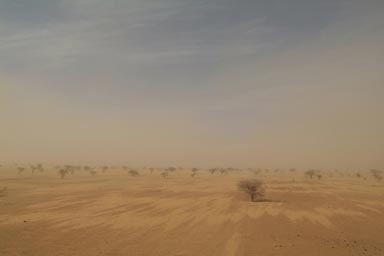
Christmas day morning, Hasna is back among the living.
The wind starts blowing early.
Already during breakfast sand everywhere.
"Sahel pure, all too normal." Birgit, "Overgrazing, the soil is a complete mess."
It's the hundreds and thousands of animals, cattle that are being kept, . "Trample down anything."
We are going separate routes from Nema, Birgit and Robert via Nouakchott back to Atar, still want to stay in Mauritania some 2 weeks, we further south towards the Malian border.
As we approach Mali, that evening the wind has settled, the Sahel presents itself much friendlier then before.
We enter Mali the next morning and a completely new world altogether.
www.thisfabtrek.com > journey > africa > mauritania > 20051225-nema

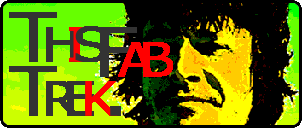


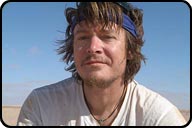
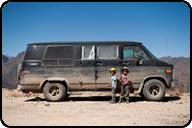
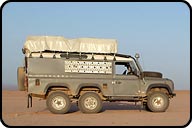

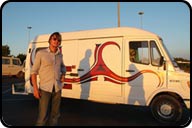
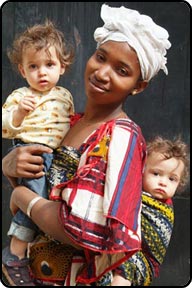
 contains Festival/Fiesta/Art photography.
contains Festival/Fiesta/Art photography.
